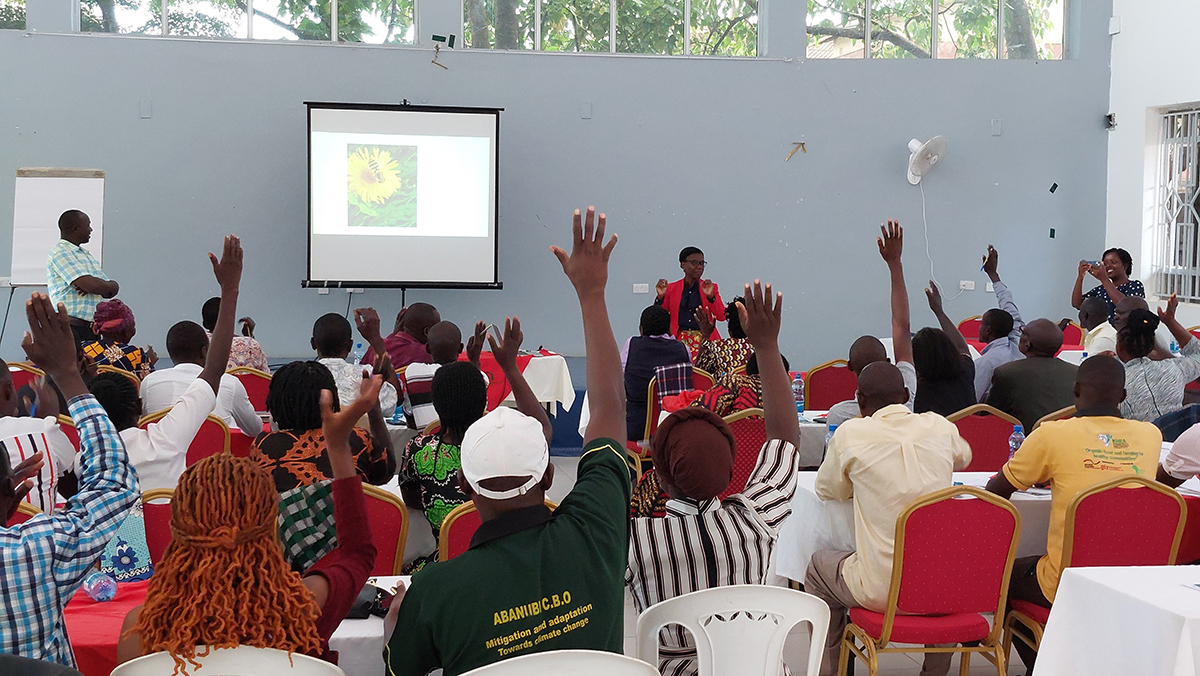Agroecology is gaining momentum as a widely advocated model for sustainable food systems transformation, especially in the developing world. This is because it embraces diverse sources of knowledge, promotes ecosystem health and provides economically sustainable livelihoods for famers.
Many scientists, agricultural businesses and food policy makers are using the principles of agroecology as a guide to advance resilient food systems that are adapted to climate change, are socially inclusive and can generate healthy food using methods easily adaptable by farmers and rural communities.
 To develop the underpinning research to support the principles of agroecology in Africa, NRI’s Prof. Steve Belmain has recently been conducting field work and training with farmer research networks in Kenya and Uganda as part of a McKnight Foundation funded research project. Over two weeks in May, Steve met with 120 lead farmers from seven different farmer research networks in western Kenya and eastern Uganda. The farmers came together to learn about best practices in making and using botanical pesticides, extracts derived from plants with naturally occurring pest control properties. They also learned why botanicals are safer and more sustainable than using synthetic pesticides. Natural botanical pesticides are widely used in organic agriculture and have become increasingly popular owing to their more benign impact on human and environmental health compared to conventional synthetic pesticides.
To develop the underpinning research to support the principles of agroecology in Africa, NRI’s Prof. Steve Belmain has recently been conducting field work and training with farmer research networks in Kenya and Uganda as part of a McKnight Foundation funded research project. Over two weeks in May, Steve met with 120 lead farmers from seven different farmer research networks in western Kenya and eastern Uganda. The farmers came together to learn about best practices in making and using botanical pesticides, extracts derived from plants with naturally occurring pest control properties. They also learned why botanicals are safer and more sustainable than using synthetic pesticides. Natural botanical pesticides are widely used in organic agriculture and have become increasingly popular owing to their more benign impact on human and environmental health compared to conventional synthetic pesticides.
Prof Belmain explains: “Throughout human history, farmers relied on using mother nature’s solutions for pest control by extracting naturally occurring chemicals found in plants that deterred and repelled pests. These age-old practices have gradually declined since the development of synthetic pesticides. Synthetic pesticide chemicals were designed to resist natural breakdown from sunlight and micro-organisms, and were extremely efficient in killing insects, both beneficial and pest insects alike. We now realise that synthetic pesticides can persist in the environment causing negative impacts to the environment and human health. As these problems have grown, both large scale farming businesses and smallholder farmers are realising that botanical products can protect crop yields often as well as synthetics but with less harm to pollinators, natural enemies, the wider environment and human health.”
Steve and his project team also raised farmers’ awareness on wider issues of ecological pest and disease management to help farmers strengthen their agroecological farming practices. This involved helping farmers recognise that not all insects on their crops are pests, where many insects are pollinators, predators or parasitoids that provide beneficial services, pollinating our crops and eating pest insects. Parasitoids are insects whose developmental stage, the larva, live as parasites inside other insects, consuming their prey from the inside.
The farmers developed plans to carry out their own research and development of local botanical pesticides with a view to drastically reducing the amount of synthetic pesticide used in their communities. Through building farmer knowledge and capacity, the project increases farmer participation and agency, putting farmers at the centre of the research and development process. It ensures that research products are grounded and receive local ownership. In their plans, the farmers aim to reduce pesticide use in their areas to pave the way for efforts to increase the presence and abundance of pests’ natural enemies in field margins around their farms. This will involve promoting flowers and plant biodiversity that provide alternative prey, nectar and pollen sources for pollinators and natural enemies.
The funding for Steve’s research is through the Global Collaboration for Resilient Food Systems, a programme created by the McKnight Foundation. The goals of this work are to ensure a world where everyone has access to nutritious food that is sustainably produced by local people. This will be enabled through collaborative agroecological systems research and knowledge-sharing that strengthen the capacities of farmer groups, research institutions, development organizations, and others. Steve’s team will continue to work with smallholder farmers in eastern Africa to develop the knowledge and tools that farmers need to manage crop pests and diseases using agroecologically sustainable and cost-beneficial methods.

